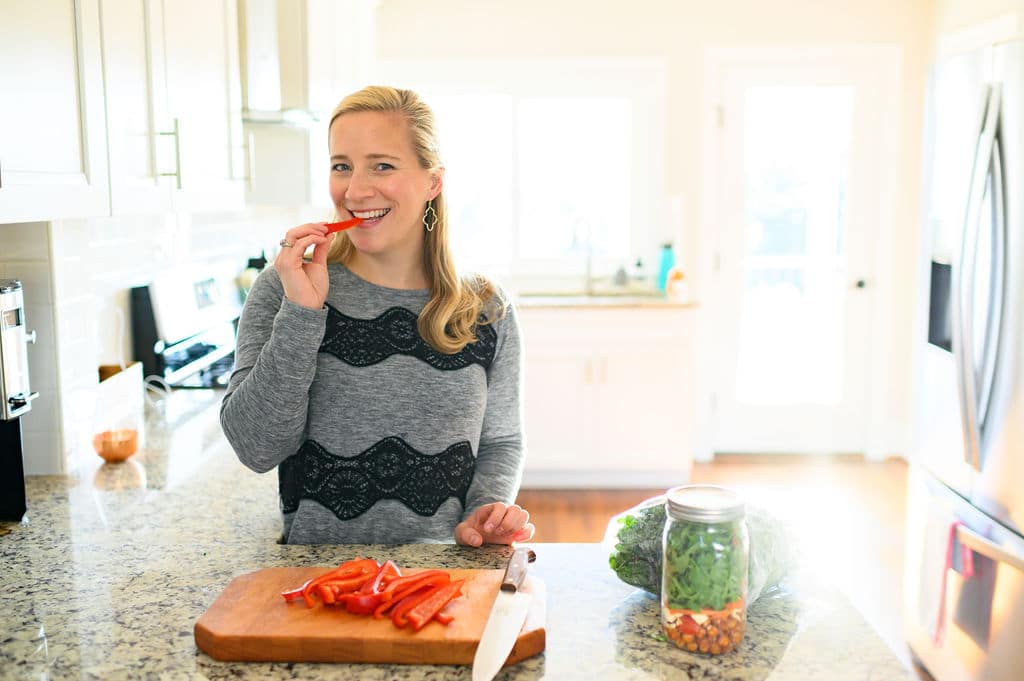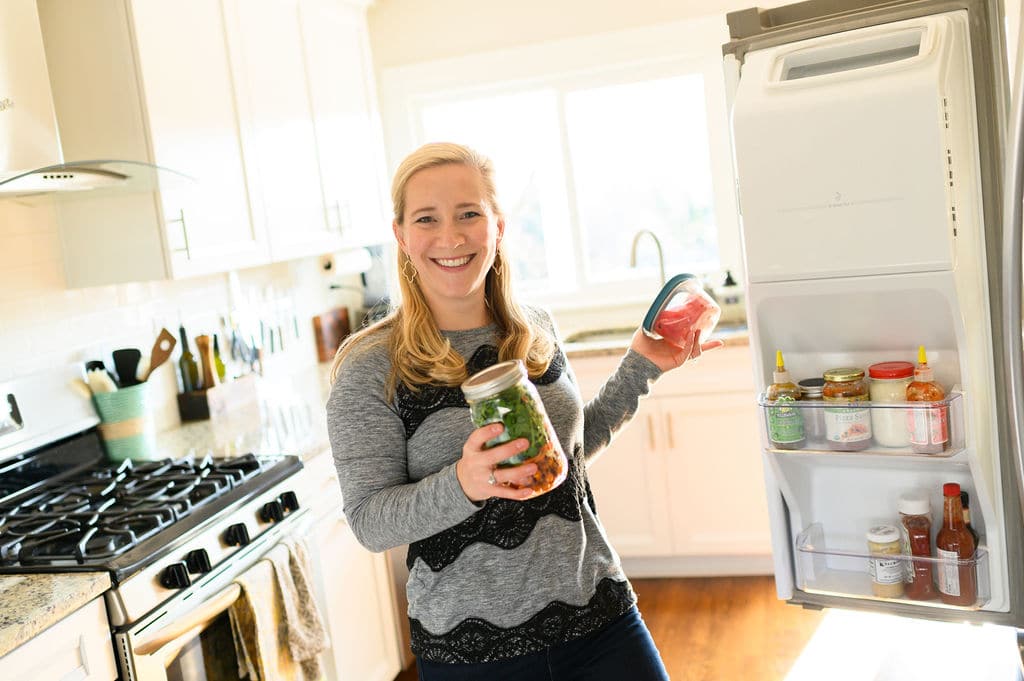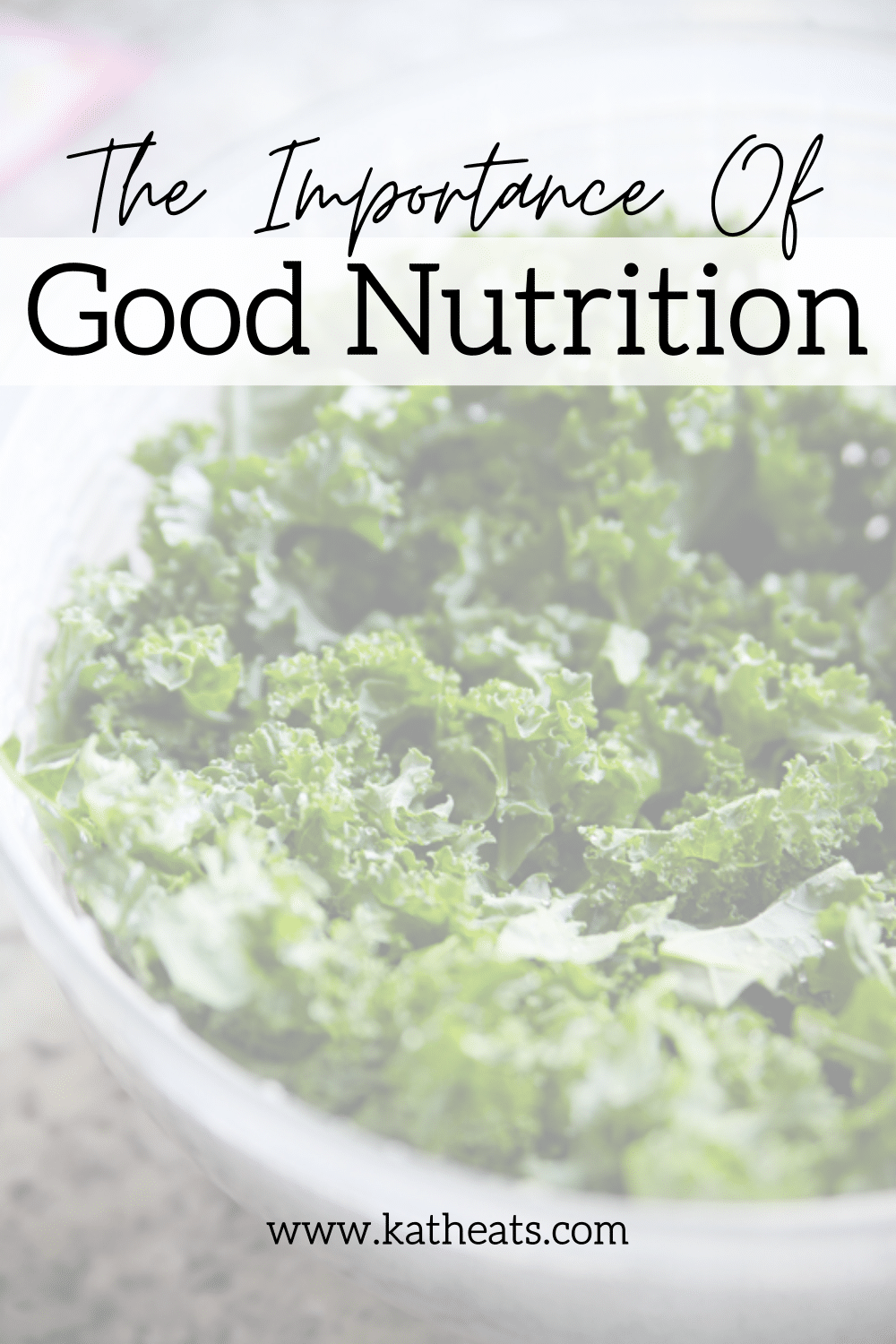This post is a long-time coming! Since before I became a Registered Dietitian, I have always been most curious about the psychology of eating and what drives us to reach for the food and snacks that we do. How do those choices affect our health and our happiness? I often say that I went to school for nutrition to be able to tell people that an apple is a better nutrition choice than a Twinkie. But WHY is an apple a better choice, and why does that even matter? That’s the question that RDs get to answer. Here’s my take on the importance of good nutrition and why what you eat is closely intertwined with how you feel.

I know I am preaching to the choir here. Many of us already know that good nutrition is so important for leading a healthy and happy lifestyle. Not only does having a balanced diet lower your risk of contracting chronic illnesses, it can just make you happier and feel better too. Practicing good nutrition starts with knowledge. KERF’s goal has always been to share the why and how of real food. If you know the why and how of good nutrition, you’re more likely to act on it. Eating healthy has countless benefits for your overall health. So below are some of the biggest advantages gained from eating healthy real foods and maintaining good nutrition.

The Importance Of Good Nutrition
Lower Risk of Diabetes, High Blood Pressure, and High Cholesterol
Chronic diseases are a serious problem in this country and many of them are related to our health crisis and the connection to food choices. Eating a real food diet high in produce and fiber keeps the risk of diabetes at bay. Plus, it keeps cholesterol and blood pressure lower (source). About one-third of children in our country are overweight. Parents making healthy changes in lifestyle by cooking healthy and being active with their families gives their kids a better shot at minimizing the risk of developing some very preventable health problems.
Stroke Prevention
Fruits, vegetables, whole grains, and dairy (with low fat) can help maintain proper blood pressure and cholesterol levels. This in turn lowers your risk of stoke both early and later in life. Stray away from too much salt and saturated fats found in processed foods to keep your sodium and fat intake at healthy levels. A weekly diet of oily fish like salmon, trout, or sardines (!!) are ideal. They provide high levels of Omega-3 fatty acids which are known to lower the risk of heart disease.
Reduce Your Risk of Cancer
Antioxidants are powerful cell protectors for our bodies. They protect cells against free radicals, making cells less likely to become cancerous. Eating antioxidants like vitamin C may protect against cancer of the oral cavity, stomach, and esophagus. Antioxidants may also reduce the risk of developing cancers of the rectum, pancreas, cervix, breasts, and lungs (source). Fruits and vegetables contain the highest density of antioxidants, so eating a rainbow of fresh produce everyday helps you give your body the tools to defend against cancer.
Improve Your Mood
Researchers have pointed to a connection between our mood and our food. Food high on the glycemic load can cause depression and fatigue. High glycemic foods flood the blood stream with glucose quickly (think soda, juice, cookies, refined flour foods), while vegetables and whole grains that bring fiber, fat and/or protein along are the opposite. Protein-rich foods are also a great choice for enhanced mood. Harvard School of Public Health states that the best “protein package” is in fish, poultry, nuts and beans.
Better Memory and Brain Function
A healthy diet is also your key to a sharp mind. Foods rich in Vitamins C, D, E, and Omega 3s are your best tools to fight cognitive deterioration. Fish (there are those sardines again!) are one of the best known sources of these nutrients needed for boosting our memory because of the nutrient group they contain. Eating a rainbow diet that includes all the food groups can provide the greatest variety of vitamins, and minerals that the body needs to support your brain. Also friends, don’t cut out all carbs or whole meals – you’re much more likely to be grumpy from low blood sugar!
Healthy Colon
As Hippocrates famously said, “all disease begins in the gut.” A healthy colon has all the essential bacteria in place to help in the digestion of the food we eat. When your diet is sugar-rich and low in fiber, the natural environment in the colon where the good bacteria thrives can be destroyed, causing inflammation. A real food diet based on vegetables and fruits and including some fermented foods, like yogurt, will provide fiber, prebiotics, and probiotics, all of which are vital for the good bacteria to survive inside our colon. Fiber also helps in developing proper and healthy bowel movements – and who doesn’t love that?!
Better Sleep
Poor nutrition is known to cause problems with sleeping . Lack of essential nutrients can literally keep you awake at night. You can be eating lots of food but still not getting the essential nutrients you need if that food is energy dense and nutrition void. You just don’t feel good when you eat poorly. I can assure you I don’t sleep well after a huge dinner, especially if red wine and dessert are involved. When you sleep well, you have better days.
Good Habits Lead To Good Health
Eating healthy can be an automatic path to losing weight for some people. However, losing weight should not be the only motivation for changing habits. The Centers for Disease Control and Prevention tells us that good health is not just about “dieting” but an ongoing lifestyle change incorporating better eating habits and routine physical activity. Diets don’t work.

Tips For Getting Good Nutrition
Change Your Mindset
Most people think eating healthy is just too difficult to implement. Well, it doesn’t have to be. Instead of thinking about what foods you can’t have, start to focus on the foods you can have. It’s easier to add than subtract! Focus on the things you can change rather than dwelling on what you can’t.
Eat The Rainbow
Fill your plate with an assortment of colors. Leafy green vegetables, red apples, oranges, beans, and nuts are great options. When your plate is colorful, you can almost guarantee you’re getting the nutrients and fiber that your body needs. Remember “eating the rainbow” means eating all the colors – ROY G BIV!
Drink Lots of Water
There is no better way to stay hydrated than by drinking enough water. Since thirst and hunger can be confused, drinking enough water can help keep appetite in check. While I wouldn’t say juice is unhealthy, it does have a high concentration of sugar. If you love juice, try cutting it with seltzer. Eating fruit itself is a better choice to drinking juice because the fruit contains all the nutrients AND the fiber. Plus you get to chew it!
Eat Starchy Carbohydrates With High Fiber
Fact: we need carbohydrates in our daily life for energy and brain function. There is no need to shun carbs in general. But fiber-filled whole grains, fruits and vegetables are better sources of carbs than refined flour products. They also come with more antioxidants.
Add Healthy Fats To Your Diet
Having a high ratio of “good fats” (nuts, avocados, fish) to bad fats (trans-fats, deep fried food) is a good practice. It has a trickle down effect on your body’s systems and leads to a lower risk of heart disease and stroke. Load up on the good fats: nuts, avocados, fish (sardines!!), nut butters, tofu, and olive oil. That’s not to say you can’t have deep fried Oreos or a couple of donuts every now and then – just work on the everyday ratio.
Skip Processed Foods aka Eat Real Food!
Processed foods are constantly linked to poor diet and health. Real food can be lightly processed, like making yogurt or tofu. Processed foods are foods that have been through multiple chemical processes in order to make them preservable, have a longer shelf life, and prevent spoiling. (Check out my post on real food for more: What is Real Food?) So bake cookies at home instead of grabbing a box of brownie bites at the store.
It’s all about every day habits
Your every day habits are what define your nutrition status. Do you eat lots of produce? Do you enjoy a wide variety of nutrient-dense foods? Save comfort foods, sugar, alcohol and processed foods for “sometimes” occasions? Rather than focusing on what you ate in a day, focus on your weekly average. If you eat unhealthy today, do better tomorrow. No one says it more succinctly than Michael Pollan: “Eat food. Not too much. Mostly plants.”

Why is good nutrition important to you?
Nutrition is really quite simple: eat a wide variety of real food. Our complex society that revolves around convenience and puts pressure on us to do all the things is what makes nutrition challenging. Drive-thru Starbucks, food platters in the break room, giant cocktails, and huge portions all make it so easy for us to eat too much of a good (tasting) thing. You have to be conscious of your why in order to make sure you’re not running on auto-pilot. You can’t have it all.
I would love to know what your inspiration for living healthy is! Please share 🙂
More posts on nutrition:



Charmaine Ng | Architecture & Lifestyle Blog says
So true! I need to take your words to heart, Kath! 🙂
Charmaine Ng | Architecture & Lifestyle Blog
http://charmainenyw.com
Michele Greenwood says
Thanks Kath; this is SUPER helpful – I have been diagnosed with binge eating disorder; after almost 8 months in counseling, I think I’m just on the tip of the iceberg of understanding WHY I have this disorder and how to ‘sit’ through my emotions without reaching for food…
I’m always looking for ideas on food – things that will feed my family but also be filling & nutritious, thank you for helping in this journey!
Kath Younger says
Thank you and best of luck in your recovery <3
Rachel says
I have noticed that the nutritionists I follow on social media are increasingly embracing the Health At Any Size approach, which is inclusive for people of all different weights. It almost feels like a throwback to 15 years ago to read your advice focusing on avoiding “obesity.” I am so curious if you are familiar with Health At Any Size and whether your views have shifted at all since you first studied dietetics.
Kath Younger says
Hi Rachel, I absolutely think bodies are beautiful at all sizes. I’ve never been one to promote thinness. The definition of obesity is clinical and defines it as a medical problem associated with increased risk of many lifestyle-related diseases, so I’m using it in that context here.
Rebecca R Cawood says
As a clinical RD, I respectfully disagree that obesity is a “medical problem” or that HAES cannot be clinically applied to chronic disease. More and more research is showing us that weight based interventions DO NOT WORK and cause significant stigma as well as health related complications.
Kath Younger says
I read up on this today and rescind my comments about obesity. (I’ve also edited the language of the post). America has a *health* crisis.
Eliza says
I agree that good nutrition is really important, but I’m wondering what your thoughts are on the barriers that exist for some people, who perhaps live in “food deserts” where it is difficult to get to a store that sells nutritious food. Or people for whom high-quality food is too expensive, or people working more than one job to make ends meet, who don’t have time to prepare meals made from “real food.” My doctor used to tell me to eat more fish, but I couldn’t afford it until recently. I think everyone understands that fresh fruit is more healthy than a twinkie, but if the only store you can get to sells wilted lettuce and mealy apples, it doesn’t make sense to waste money on food that is going bad. As you said, processed foods have a longer shelf life, so sometimes they are the choice that makes sense for many circumstances.
Cyndi says
Good tips, although I personally disagree with eating low fat dairy (full fat = more satisfying), the belief that saturated fat should be avoided (newer studies show no correlation to heart disease), and that carbohydrates are ‘essential’ (at least not to the extent that the Standard American Diet would have you eat). I had a return to health (both in biometrics and just the way I feel in general) by doubling my fat intake (including saturated fats), switching to grass fed beef, and greatly limiting sugars and carbs (of all kinds – whole grain and refined). Find what works for you!
Kelly says
This post feels a little dated. I recommend following Christy Harrison, RD for info on Health at Every Size and why speaking in terms of the “obesity epidemic” is problematic and not ultimately very helpful for individuals or society at large.
Kath Younger says
I am reading up on this
Kath Younger says
I have corrected some of my terminology to more accurately describe the ways nutrition and health are related.
Kelly says
Awesome. Thanks for providing this platform and for being open minded and willing to explore this. It’s an evolution for sure and it took me awhile to shift out of diet culture mentality and really consider how we can all support each other and our physical and mental health.
Kath Younger says
the recent research on HAES is new to me. Fascinating and encouraging.
Shelly says
I second the recommendation of Christy Harrison and her Food Psych Podcast. Her outlook and HAES research and data are up to date and provide very helpful info on health and wellness.
Katelyn says
Thank you for this post! I always appreciate your dietetics knowledge and advice. My son was born last August, and I’m finally starting to really focus on postpartum weight loss and fitness (now that my 8.5 month old is finally sleeping through the night and I have energy!). I’m going back to basics, tracking food using the MyPlate app and moving 30-60 minutes most days. I’ve always loved your non-diet message and “squiggly line effect” theory! Not that weight loss or a number on the scale should be the primary focus, but do you have any additional advice for weight loss after having a baby? I know you used Aptiv with your treadmill. Just curious if you tracked food for some time or did any other specific things for postpartum weight loss.
‘
Kath Younger says
Hi Katelyn! I would recommend focusing on making good choices – continue to eat well and move more! Now that the weather is nicer, stroller walks will be so fun with an 8.5 month old 🙂 I didn’t do any tracking, but I am always aware of making good choices. I think sleeping through the night is key to getting the energy you need for self care and movement.
Beth says
I also am an RD and find the content as well as the comments very interesting. I think nutrition is one piece of the puzzle when it comes to managing health. Weight is more complicated than calories in calories out. Initally the HAES approached seemed like “nothing is going to change weight, so just accept it and move on”. But learing more about it has helped as a practitioner because physical, behavioral and emotional health ALL matter.
Mara says
You’re right, nutrition really can improve your mood, I experienced this myself. I’m also trying to switch to a healthier lifestyle and started to mine for healthy recipes like yours. Also, I started a marathon training with SportMe, and I managed to get rid of some pounds. Your blog posts are super inspiring for me in this phase, thanks!
Nicole says
Great article Kath! Thank you!!
Jessica Moore says
Found this really interesting, thanks for sharing!
Jackie says
Hi, Kath!
This was such an informative post. I think that many people associate a healthy diet with a lower risk of diabetes and high cholesterol, but some may not be aware that it could also lead to a better overall mood and a reduction in cognitive decline, so thank you for pointing that out.
I also enjoyed your tip on thinking of your diet as a weekly average. That kind of grace is useful.